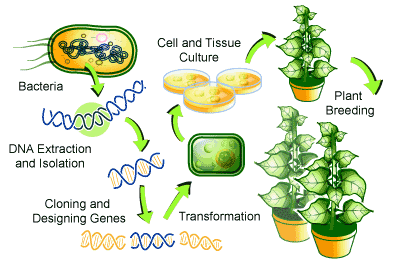Ahmedabad
(Head Office)Address : 506, 3rd EYE THREE (III), Opp. Induben Khakhrawala, Girish Cold Drink Cross Road, CG Road, Navrangpura, Ahmedabad, 380009.
Mobile : 8469231587 / 9586028957
Telephone : 079-40098991
E-mail: dics.upsc@gmail.com

Transgenic Crops
News: Recently, Gujarat, Maharashtra and Telangana, have deferred a proposal, approved by the Centre’s Genetic Engineering Appraisal Committee (GEAC), to test a new kind of Transgenic Cotton Seed that contains a gene, Cry2Ai.
Background:
• Gene Cry2Ai makes cotton resistant to pink bollworm, a major pest.
What are Transgenic crops?
• Transgenic crops are plants that have been genetically modified using recombinant DNA technology to introduce new traits that do not occur naturally in the species.
What is difference between Transgenic crops and GMOs?
• Transgenic crops are a type of genetically modified organisms (GMOs) that have been engineered to carry genes from different species using recombinant DNA technology. GMOs are broader term that includes any organism whose genome has been altered by human intervention, either by adding, deleting, or editing genes.
• Not all GMOs are transgenic, as some may have genes from the same or closely related species. For example, cisgenic crops are GMOs that have genes from the same or compatible species, and gene-edited crops are GMOs that have genes that are modified within the same species.
What are advantages of Transgenic crops?
• Improvement in yield, quality, and resistance to insects, diseases, herbicides, and abiotic stresses, resulting in higher productivity and food security.
• Enhancement of the nutritional content of the crops, such as vitamin A in golden rice, which can prevent malnutrition and related diseases.
• Lowering of the transportation costs and environmental impact of the crops, by delaying the ripening and softening of fruits and vegetables, reducing the need for pesticides and herbicides, and improving the soil quality.
• Production of recombinant proteins with industrial and pharmaceutical value, such as vaccines, antibodies, enzymes, and bioplastics, using plants as factories.
• Rapid and accurate technique for gene transfer with no barrier for gene exchange, allowing for precise manipulation of desired traits and overcoming the limitations of conventional breeding method.
• Some examples of transgenic crops are golden rice, Bt cotton, and herbicide-tolerant soybean.
What are the disadvantages of Transgenic crops?
• Potential health risks, such as allergic reactions, emergence of new allergens, increased toxicity, and reduced nutritional value.
• Environmental impacts, such as increased use of herbicides, emergence of herbicide-resistant weeds, contamination of organic and conventional crops, loss of biodiversity, and disruption of natural ecosystems.
• Socio-economic and ethical issues, such as patenting of life forms, corporate control of agriculture, loss of farmers’ rights and choices, violation of religious and cultural values, and lack of public awareness and participation.
• Transgenic crops may also pose challenges for trade, regulation, labeling, and consumer acceptance.
How are GM crops regulated in India?
• In India, the regulation of all activities related to GMOs and products are regulated by the Union Ministry of Environment, Forest and Climate Change (MoEFCC) under the provisions of the Environment (Protection) Act, 1986.
• Genetic Engineering Appraisal Committee (GEAC) under MoEFCC is authorised to review, monitor and approve all activities including import, export, transport, manufacture, use or sale of GMO.
• Other acts and rules that regulate GM crops include - Environment Protection Act, 1986 (EPA), Biological Diversity Act, 2002, Plant Quarantine Order, 2003, GM policy under Foreign Trade Policy, Food Safety and Standards Act, 2006 and Drugs and Cosmetics Rule (8th Amendment), 1988.

Address : 506, 3rd EYE THREE (III), Opp. Induben Khakhrawala, Girish Cold Drink Cross Road, CG Road, Navrangpura, Ahmedabad, 380009.
Mobile : 8469231587 / 9586028957
Telephone : 079-40098991
E-mail: dics.upsc@gmail.com
Address: A-306, The Landmark, Urjanagar-1, Opp. Spicy Street, Kudasan – Por Road, Kudasan, Gandhinagar – 382421
Mobile : 9723832444 / 9723932444
E-mail: dics.gnagar@gmail.com
Address: 2nd Floor, 9 Shivali Society, L&T Circle, opp. Ratri Bazar, Karelibaugh, Vadodara, 390018
Mobile : 9725692037 / 9725692054
E-mail: dics.vadodara@gmail.com
Address: 403, Raj Victoria, Opp. Pal Walkway, Near Galaxy Circle, Pal, Surat-394510
Mobile : 8401031583 / 8401031587
E-mail: dics.surat@gmail.com
Address: 303,305 K 158 Complex Above Magson, Sindhubhavan Road Ahmedabad-380059
Mobile : 9974751177 / 8469231587
E-mail: dicssbr@gmail.com
Address: 57/17, 2nd Floor, Old Rajinder Nagar Market, Bada Bazaar Marg, Delhi-60
Mobile : 9104830862 / 9104830865
E-mail: dics.newdelhi@gmail.com